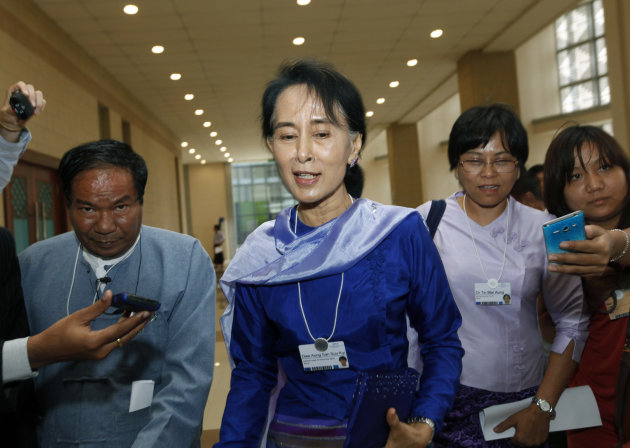
Myanmar prepared Wednesday to show off what two years of reform-minded elected government has accomplished as it welcomed business titans and decision-makers from around the world to the Asian edition of the prestigious World Economic Forum.
President Thein Sein will inaugurate the meeting Thursday and is scheduled to share the stage with the prime ministers of Laos and Vietnam to discuss opportunities for development in Asia. Organizers boast that it is the first international conference of its size and importance to be held here, saying more than 900 participants from 50 countries are attending.
While the conference has the inclusive theme of "Courageous Transformation for Inclusion and Integration," the focus of most participants will be on host Myanmar, emerging from almost five decades of military rule into the challenges of transitional democracy and the potentially lucrative status of a frontier economy.
"It shows that the outside world recognizes Myanmar as a country that has potential. It's also an indicator that there will be more investments in the country," said Nay Zin Latt, an adviser to Thein Sein. "The country earns lots of attention and interest in investing. Then, we will have more job opportunities and our economy can be improved."
Outsiders make much the same point.
"For much of the 20th century, Myanmar largely missed out on the spectacular growth seen across most of the global economy and most recently in its Asian peers," Richard Dobbs, a director of the consulting group McKinsey & Company, said last month. "It now has the potential to be one of the fastest-growing economies in emerging Asia."
McKinsey predicted in a report last month that "Myanmar could potentially quadruple the size of its economy from $45 billion in 2010 to more than $200 billion in 2030, creating 10 million non-agricultural jobs and potentially lifting 18 million out of poverty in the process."
There's quite a long way to go, pointed out Sushant Palakurthi Rao, head of Asia for the World Economic Forum, with much improvement needed in sectors such as education, health care and job training.
"The main goal is to show that the doors are open," he said. "But challenges remain. It's a country where still 26 percent of the population live in poverty, 37 percent are unemployed, and it's important to use those investments now to really have rapid change and impact for a wide range of people in the country."
Another note of caution was sounded by the British development charity Oxfam, which warned recently that "without targeted policy efforts and regulation to even the playing field, the benefits of new investment will filter down to only a few, leaving small-scale farmers — the backbone of the Myanmar economy — unable to benefit from this growth."
It urged Myanmar's leaders to "address power inequalities in the markets, put small-scale farmers at the center of new agricultural investments, and close loopholes in law and practice that leave the poorest open to land-rights abuses."
Human rights concerns are another potentially destabilizing holdover from the old military regime. The government has so far failed to reach a comprehensive peace with its fractious ethnic minorities who have sought more autonomy for decades, and has been fighting a bloody war against the Kachin minority in the north for the past two years.
It has also seen the rise of vicious sectarian violence directed at the country's Muslim Rohingya minority in western Rakhine state, with hundreds of people killed and about 140,000 made homeless in civil strife last year. Deadly anti-Muslim violence spread to other parts of the country this year, damaging the government's credibility.
Salil Shetty, secretary general of the human rights group Amnesty International, who is attending the forum, said the government should make it a priority "to put an end to all forms of discrimination. People need to feel as equal citizens of this country whether they are from one ethnic group, one religion or the other."-Yahoo News

No comments:
Post a Comment